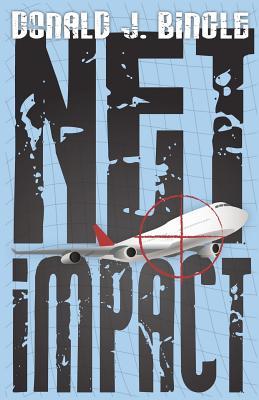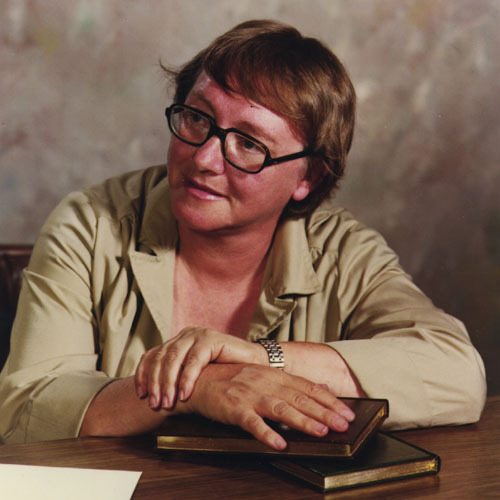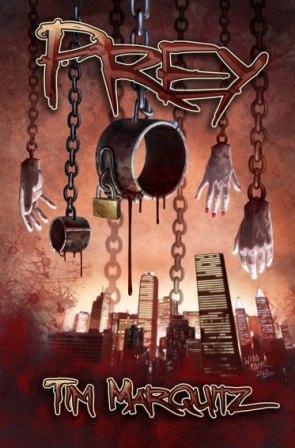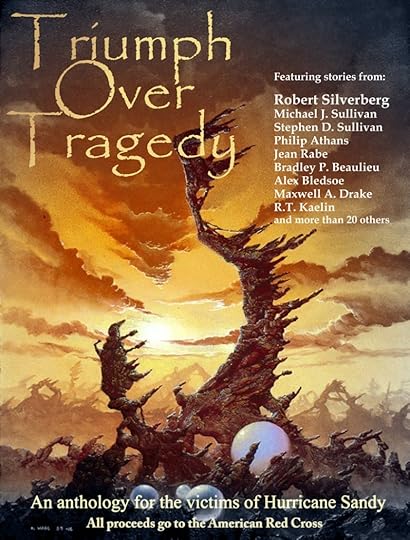Sarah Chorn's Blog, page 111
November 19, 2012
Triumph Over Tragedy Guest Post | Mark Lawrence
This post is part of a series of guest posts by the authors contributing to Triumph Over Tragedy. They will spontaneously appear over the next few weeks. I have asked authors to write about how life experiences affect their writing (or reading).
Thanks to the authors for taking time out of their lives to write these guest posts.
As always, you can check out more about Triumph Over Tragedy, or donate here.
(On a personal note, I want to thank Mark for writing this post and letting me use it on my website. His post from my Special Needs in Strange Worlds series – which you can find on my Guest Posts/Interviews tab – still resonates profoundly with me. He has some amazing knack for touching me on an incredibly deep level, so I’m thrilled to add this post to my list of mind blowing guest posts that have been, and will be featured on my website.)
—–
 About the Author
About the Author
Mark Lawrence is married with four children, one of whom is severely disabled. His day job is as a research scientist focused on various rather intractable problems in the field of artificial intelligence. He has held secret level clearance with both US and UK governments. At one point he was qualified to say ‘this isn’t rocket science … oh wait, it actually is’.
Between work and caring for his disabled child, Mark spends his time writing, playing computer games, tending an allotment, brewing beer, and avoiding DIY.
The Prince of Thorns is his first published novel. It is the beginning of a projected trilogy following the fortunes of Honorous Jorg Ancrath.
You can find out more about Mark and his books on his website, or follow him on Twitter and Facebook.
Now, onto Mark’s incredible post….
I don’t know many writers. I’ve met five in total, and they were a disperate handful. All of them verbally dexterous, all of them clever and thoughtful, but beyond that a diverse bunch.
Our writing experiences seem to be equally varied. Some of us agonize over each element of plot and prose, others dash it down and move on. Some focus on action, some on character, others build world’s first and the populate their stage.
What I think might unite us as a common core is that writing is hard – you need to push against an invisible something that doesn’t want to move, and doing so exhausts some secret muscle you didn’t know you had. It requires you to exercise both your imagination and your emotions, stretching both to a degree where it starts to hurt. And beyond that, the sharing of that writing – which undeniably you have put something of yourself into, something personal and generally hidden – that sharing requires courage.
There are certain people that like to over-share. People who will assault strangers with their intimate personal details, people who with the slightest provokation will shine an unwanted light on the mechanics of their close relationships, or elaborate upon the most trivial and embarrassing of their medical complications. My limited experience of writers suggests that we’re not those people. Putting ourselves out there isn’t an instinct – it’s a gamble, a risk.
Ernest Hemmingway famously said: “There is nothing to writing. All you have to do is sit down at a typewriter and bleed.” That is certainly an overstatement for me, but then again I won’t be counted a giant of literature a half century after I’m dead. It’s true though that the occasions when it has felt more like bleeding are the ones that led to passages of mine that are most talked about and quoted.
To do that, and then put it up for rejection, and failing rejection, to have it published and exposed to ridicule, requires courage. Just because you have felt something passionately, and what you wrote resonates back with you when you read it – does not mean that it will echo with others or that it is well written. It is a risk.
The penalty is nebulous and can be dismissed as insubstantial, but it has sharper edges than any reply that girl you asked to dance at the school disco ever gave you.
To the theme of this post – Sarah invited a triumph over tragedy vibe, an insight into how life experience lensed into writing practice.
Clichés exist because there are things that are so true they bubble spontaneously from many sources. Clichés aren’t wrong, just over used. It’s a cliché to say that surviving a tragedy gives you a new perspective. The man still standing after a building has fallen around him, or reprieved from some terminal condition, will tell us that the world looks different, that trivial concerns now seem exactly hat, trivial, and will no longer tug at him. He will concentrate on what matters from now on, walk taller, be a better person. That’s how we feel at such times. There’s a half-life to it though. Good intentions slip, resolutions slide, and the world catches hold of us again by degrees, sinking innumerable petty little hooks into us.
My tragedy was largely vicarious. It’s my daughter’s tragedy. There’s a reaction against using that word in the same breath as disability because it can seem to belittle the person, to focus on what’s been lost rather than what skills and potential they have. I agree with that sentiment. My daughter was severely disabled by complications during her birth but she loves life, is happy as often as she can be, and is a tremendously valuable and wonderful person. She even has a picture-book in the semi-finals of the Goodreads Choice Award! But, none of that changes the fact that I will always feel that the randome chance that stole her ability to speak, to walk, to hold, to eat, to sit, to see a horizon, and to grow without pain was a tragedy.
She is not tragic – what happened to her was a tragedy.
And some small part of it was my tragedy too – and it made me feel like the man in the cliché. And whilst the world has stolen away much of that feeling of invulnerability – that false conviction that you’ve faced the worst and nothing could now hurt you – I retained some small measure of that courage. And it’s that courage, bolted to my original marginal stock, that tipped my hand, made me send my manuscript out, and made me smile whenever I got a bad (or sometimes hateful) review, knowing that in the grand scheme of things, and indeed in pretty much every minor scheme of things too, it really didn’t matter much. What mattered was that I’d said what I had to say, I’d drawn my line in the sand, and whether it lasted, whether it was noticed, whether that girl adt the disco said no and her friends giggled behind their hands – I had taken my chance and would not regret doing so.
November 16, 2012
Apollo’s Outcasts – Allen Steele
 About the Book
About the Book
In the tradition of Robert A. Heinlein’s juvenile classics, crafted with a modern sensibility. Jamey Barlowe has been crippled since childhood, the result of being born on the Moon. He lives his life in a wheelchair, only truly free when he is in the water. But then Jameys father sends him, along with five other kids, back to the Moon to escape a political coup detat that has occurred overnight in the United States. Moreover, one of the other five refugees is more than she appears. Soon Jamey is front and center in a political and military struggle stretching from the Earth to the Moon.
300 pages (hardcover)
Published on November 6, 2012
Published by Pyr
Author’s website
This book was provided for me to review by the publisher.
You can purchase a copy of this book by clicking on the following links: Apollo’s Outcasts , Apollo’s Outcasts – Kindle
, Apollo’s Outcasts – Kindle
—–
I like science fiction and I don’t read nearly as much of it as I should. I’ve probably read a handful of young adult science fiction books in my entire life. For some reason I have a hard time finding them. Anyway, when Pyr asked me if I’d like a review copy of Apollo’s Outcasts, how could I say no?
Jamey, the teenaged protagonist, is a character that will fascinate readers from the start. Born on the Moon, Jamey has a disability on Earth which keeps him in the futuristic version of a wheelchair. First, after my Special Needs in Strange Worlds series, I now always find myself interested in characters with disabilities. Secondly, Jamey’s disability interested me so much because it points to another very unique aspect of this young adult book: the science.
Usually in young adult books I expect science to be watered down or nearly nonexistent. I especially expect that from young adult science fiction. It’s hard to explain some of these complex theories to a younger audience in a way they’ll understand and retain an interest. However, Steele uses Jamey’s handicap in such a way that readers can’t help but learn the science. Since Jamey is a living example of how gravity can effect human bones, readers will automatically learn about the force of gravity. Steele’s incredible grasp of understanding and conveying complex scientific theories doesn’t stop with Jamey. In fact, the habitat on the Moon is also another way for Steele to teach his audience quite a bit about the universe, and he does it masterfully. The nerd in me loved the fact that, no matter your age, you will undoubtedly come away from Apollo’s Outcasts learning and appreciating something new.
That being said, the plot is rather predictable and harkens unto the age of classic science fiction and fantasy where stories focused on the unexpected “chosen one” who becomes the pivot point around which a larger issue/quest is centered. While that is usually a gripe in my reviews, it isn’t really in this regard. Apollo’s Outcasts is one of those books that will remind you of those classic tales you’ve probably read before. Steele’s obviously in-depth understanding of the science and his updated, believable technology keep the been-there-done-that bones of the plot fresh and invigorating.
Jamey is a very believable and fleshed out character to follow. He’s also incredibly compelling, as he has to live both with and without a disability through the course of the novel. It’s interesting to see how Steele has used his disability to shape him. Though Jamey has a few problems of his own, namely his inability to come to certain conclusions when he probably should. There are a few occasions when Jamey, despite being incredibly smart, realizes some very obvious things long after his fellow characters, or even the readers. This can be frustrating, as it can leave readers with a feeling that the book needs to catch up with where they are.
Many of the secondary characters fall flat and a bit too cookie cutter for my taste. The antagonist fills the traditional almost unbelievably evil role while the Moon colonists, and the people who travel there with Jamey, for the most part, are portrayed to be nearly angelic. This lack of depth in secondary characters can make the plot seem a little thin, though for the most part the adventure itself will help readers overlook some of these issues.
Aside from all the science and the attempts to triumph over evil, Apollo’s Outcasts has a dollop of teenage romance and some angst for readers who enjoy that sort of thing, though Steele keeps it from overpowering the plot. It’s a nice additive that will appeal to many readers and has a tendency to bring the science and political tension down to a more palatable level.
At the end of the day, Apollo’s Outcasts somehow manages to be nostalgic and refreshing at the same time. Jamey is a wonderful character to follow, and Steele really should be heralded for his understanding and adept use of science. While this book is billed as young adult, it’s easy to see how it could appeal to an audience that spans all ages. It’s adventurous, quick moving, and intense. Steele’s flowing prose will bring the world and situations to life and the fairly short length of the book makes this a quick read that won’t easily be forgotten.
3.5/5 stars
November 15, 2012
Triumph Over Tragedy Welcomes Mark Lawrence
Mark Lawrence is a hell of a guy. I admire him immensely as both an author and a human being. His books are mind blowing, and he was kind enough to write one of the most memorable and touching guest posts I’ve featured on my blog called Broken Heroes, which he kindly wrote for my Special Needs in Strange Worlds event last May.
Mark is one of those authors who is not only kind and humble online, but also seems to have this untapped well of talent with his writing. His writing is fantastic, and his books are phenomenal. He’s a hell of a guy to boot. You can imagine why I’m so thrilled to welcome him aboard Triumph Over Tragedy and send a million thank you’s his direction for contributing a story to this growing anthology.
As always, to learn more about Triumph Over Tragedy please look at our IndieGoGo page.
 About Mark Lawrence
About Mark Lawrence
Mark Lawrence is married with four children, one of whom is severely disabled.
His day job is as a research scientist focused on various rather intractable
problems in the field of artificial intelligence. He has held secret level clearance
with both US and UK governments. At one point he was qualified to say
‘this isn’t rocket science … oh wait, it actually is’.
Between work and caring for his disabled child, Mark spends
his time writing, playing computer games, tending an allotment,
brewing beer, and avoiding DIY.
The Prince of Thorns is his first published novel. It is the
beginning of a projected trilogy following the fortunes of
Honorous Jorg Ancrath.
You can learn more about Mark and his books on his website, Facebook, or follow him on Twitter.
November 12, 2012
Triumph Over Tragedy Welcomes Elizabeth Bear
Occasionally I get a bug up my butt.
This is a very unprofessional way of me saying that sometimes I get these harebrained ideas and I act on them with very little forethought. This basically sets the whole stage for why I contacted Elizabeth Bear about participating in this anthology. You see, there are a few authors out there who I admire so much I’m too terrified to actually talk to them (Call it intimidation. That makes me feel better.). Elizabeth Bear is one of them. She’s just amazing, with this incredible talent that always floors me.
So I saw her on Twitter, and I was half asleep. I was watching her say something to someone and I thought, “You know what would be cool? If Elizabeth-freaking-Bear participated in the anthology.”
With just about that much thought, I sent her an email telling her about it. She responded in about 2 seconds flat asking for more information at which point I started kind of giggling like a werido. I wrote her back this fangirl spasm which said something that roughly translated into, “I CAN’T BELIEVE ELIZABETH BEAR EMAILED ME BACK!” … and then I got Ryan to (professionally) give her the details.
After work tonight, I was delighted to see her contribution to the anthology in my inbox and so I figured I’d officially announce this speculative fiction powerhous’s participation in Triumph Over Tragedy.
As always, please check out our IndieGoGo page to contribute or preorder a copy of this book.

photo credit: Kyle Cassidy
About the Author (In her words)
I was born on the same day as Frodo and Bilbo Baggins, but in a different year (I can only hope that this presages that I, too, will live to be eleventy-one) — but because my parents were hippies, I was nearly named after Peregrin Took. With the exception of seven years in Faerie, or perhaps Las Vegas (they are not so different, really) I have been a New Englander all my life — Connecticut, Vermont, and now Massachusetts. I serve as an alloparent to two amazing (very) young men, Sunil and Naveen, from whom I am constantly learning new and amazing things.
I share my living quarters in a drafty Victorian (which, as of this writing, has just celebrated its eleventy-first) with a giant, ridiculous dog (he happens to be a Briard). I am a terrible but enthusiastic guitarist, a reasonably good and even more enthusiastic cook, and a hobby outdoorswoman. My sports are hiking, running, yoga, archery, kayaking, and rock climbing (sport and top rope, though someday I hope to learn trad).
I am the author of a number of novels and short stories in the science fiction and fantasy genre, and have been fortunate to receive a good deal of recognition for that work including two Hugo Awards, the John W. Cambell Award for Best New Writer (2005), a Sturgeon Award, a Locus Award, an Asimov’s Reader’s Choice award, a Spectrum Award, and an honorable mention for the Philip K. Dick Award. I have also been nominated for the World Fantasy Award, the British Science Fiction Award, the Lambda Award, the Romantic Times Reader’s Choice Award, and several others.
My work has been translated into Japanese, Italian, Spanish, Czech, Russian, Polish, and Portuguese, among other languages.
I enjoy teaching workshops, and have done instructor stints at Clarion, Clarion West, the WisCon Writer’s Respite, and Odyssey. I am a regular instructor at Viable Paradise.
My partner is a fantasy novelist who lives in Wisconsin. Nope, not that one.
…I spend a lot of time on planes.
——
You can learn more about the esteemed Elizabeth Bear on her website and follow her on Twitter.
Credit where credit is due – The About the Author portion was taken directly from her own About the Author page (Obviously. I think officially stating that makes me seem less of a thieving psycho… or something.)
Triumph Over Tragedy Guest Post | Donald J. Bingle
 About the author
About the author
Best known as the world’s top-ranked player of classic role-playing games for fifteen years, Donald J. Bingle is an oft-published author in the science fiction, fantasy, horror, thriller, steampunk, romance, and comedy genres, with several published novels (including Net Impact, Forced Conversion and GREENSWORD) and more than thirty-five stories, primarily in DAW themed anthologies and tie-in anthologies, including short fiction in The Crimson Pact, Carnage & Consequences, Imaginary Friends, Fellowship Fantastic, Zombie Raccoons and Killer Bunnies, Time Twisters, Front Lines, Slipstreams, Gamer Fantastic, Transformers Legends, Search for Magic (Dragonlance), If I Were An Evil Overlord, Time-Traveled Tales, Civil War Fantastic, Future Americas, All Hell Breaking Loose, The Dimension Next Door, Sol’s Children, Love & Rockets, and Pandora’s Closet.
Many of Don’s stories are electronically available, individually or in his Writer on Demand TM collections by genre, including “Tales of Gamers and Gaming,” “Tales of Humorous Horror,” “Tales Out of Time”, “Grim, Fair e-Tales,” “Tales of an Altered Past Powered by Romance, Horror, and Steam,” and “Not-So-Heroic Fantasy.” More collections of stories will be coming soon.
His original stand-alone tale, “Gentlemanly Horrors of Mine Alone,” is available for just 99 cents.
Donald J. Bingle is a member of the Science Fiction and Fantasy Writers of America, International Thriller Writers, the International Association of Media Tie-In Writers, the GenCon Writers Symposium, the Origins Game Fair Library, and the St. Charles Writers Group.
You can find out more about him on his website, Facebook, and Twitter.
How Travel Impacts Writing
Travel can affect your wrting in more ways than you know. Sure, you get to see the wonders of the world and experience the sounds and smells and tastes and textures of foreign lands and the idiosyncracies of life in different places. But, more importantly, you get some appreciation of the differences between an American experience: what it is like to not have the freedom to speak your mind, what worries you have when you don’t haver a police force and judicial system which is for the most part fair and orderly. You can vicariously experience poverty at a level unheard of here–where people literally do break rocks with a pickaxe in 100 degree plus heat for a living, where picking through garbage is a daily event, where water and shelter and food are not taken for granted.
Your writing can not only be informed by overcoming your own adversities, but by witnessing how others overcome theirs, but still manage a laugh and a smile and a welcoming hand.
Author’s works
 First, I’d like to thank Don for taking part in Triumph Over Tragedy. I’d like to point you, dear reader, in the direction of his new book.
First, I’d like to thank Don for taking part in Triumph Over Tragedy. I’d like to point you, dear reader, in the direction of his new book.
You can check out more about Net Impact by clicking this link
, or looking at the video trailer here.
Says Game Knight Reviews about Net Impact: “This is a spy novel that intersects with the world of MMORPGs and combines a set of topics I haven’t seen before. It is a bit of The DaVinci Code with some James Bond and a modern virtual reality spin … I won’t spoil it for you, but there is some international and corporate espionage-style intrigue, family strife, and a fun bit of conspiracy theory. Plus, it’s very well written book and a fun, fast read.”
Says Geekcentricity.com about Net Impact: “Net Impact was a great read and has completely changed my perspective on spy thrillers.”
As always, check out our IndieGoGo site to donate to help those impacted by Hurricane Sandy.
Announcing Triumph Over Tragedy Author Guest Posts
 As most of you know by now, I’m heavily invested in Triumph Over Tragedy. I’m spending several hours a night doing Triumph Over Tragedy related things, like trying to do a bit of PR to spread the word about the anthology and authors in it, and/or editing stories. It was in one of my “trying to spread the word” moments that I had the idea to have some of the authors who are writing and donating stories for this anthology guest post on my blog.
As most of you know by now, I’m heavily invested in Triumph Over Tragedy. I’m spending several hours a night doing Triumph Over Tragedy related things, like trying to do a bit of PR to spread the word about the anthology and authors in it, and/or editing stories. It was in one of my “trying to spread the word” moments that I had the idea to have some of the authors who are writing and donating stories for this anthology guest post on my blog.
I thought this might be a good idea for two reasons:
1. Through author guest posts, readers of my blog can get to know the authors and this will hopefully help generate interest in the author, their books, and Triumph Over Tragedy.
2. The authors participating in this anthology are donating a lot of time and effort to help a great cause. They deserve to be recognized and appreciated. I hope to help them get that recognition and appreciation by giving them some limelight on Bookworm Blues.
I asked authors to write a guest post about how life events and experiences can impact their writing. This post was supposed to go up yesterday so my first author guest post would go up today, but the Marion Zimmer Bradley news fell on us and that post went up instead. Today you’ll get two posts: This one, and my first author guest post.
I won’t post author guest posts every day, just a few a week as they come in so I can still get reviewing done as well.
As always, you can check out more about this project at our IndieGoGo page.
November 11, 2012
Triumph Over Tragedy Lands Marion Zimmer Bradley
Really, the title says it all.
The Marion Zimmer Bradley Literary Works Trust contacted R.T. Kaelin today, at which point he forwarded me their offer to add a story from literary giant Marion Zimmer Bradley to our Triumph Over Tragedy anthology. We both shared a virtual moment of bliss before we started trumpeting this incredible news to the world.
Marion Zimmer Bradley’s book The Mists of Avalon was the first fantasy book I ever read, and I truly credit her for my love of this genre. Having a story of hers in this anthology means the world to me.
 About Marion Zimmer Bradley
About Marion Zimmer Bradley
Marion Zimmer was born in Albany, NY, on June 3, 1930, and married Robert Alden Bradley in 1949. Mrs. Bradley received her B.A. in 1964 from Hardin Simmons University in Abilene, Texas, then did graduate work at the University of California, Berkeley, from 1965-67.
She was a science fiction/fantasy fan from her middle teens, and made her first sale as an adjunct to an amateur fiction contest in FANTASTIC/AMAZING STORIES in 1949. She had written as long as she could remember, but wrote only for school magazines and fanzines until 1952, when she sold her first professional short story to VORTEX SCIENCE FICTION. She wrote everything from science fiction to Gothics, but is probably best known for her Darkover novels.
In addition to her novels, Mrs. Bradley edited many magazines, amateur and professional, including Marion Zimmer Bradley’s FANTASY Magazine, which she started in 1988. She also edited an annual anthology called SWORD AND SORCERESS for DAW Books.
Over the years she turned more to fantasy; THE HOUSE BETWEEN THE WORLDS, although a selection of the Science Fiction Book Club, was “fantasy undiluted”. She wrote a novel of the women in the Arthurian legends — Morgan Le Fay, the Lady of the Lake, and others — entitled MISTS OF AVALON, which made the NY Times best seller list both in hardcover and trade paperback, and she also wrote THE FIREBRAND, a novel about the women of the Trojan War. Her historical fantasy novels, THE FOREST HOUSE and LADY OF AVALON are prequels to MISTS OF AVALON.
She died in Berkeley, California on September 25, 1999, four days after suffering a major heart attack. She was survived by her brother, Leslie Zimmer; her sons, David Bradley and Mark Greyland; her daughter, Moira Greyland; and her grandchildren.
Look at this website for more information about the author and her massive contribution to speculative fiction.
Thanks so much to the Marion Zimmer Bradley Literary Works Trust for generously donating one of Bradley’s incredible stories to this anthology.
To donate to Triumph Over Tragedy, or learn more about this effort to help those effected by Hurricane Sandy, please visit our IndieGoGo page. Please spread the word about this project. The more people we reach, the more we can help.
November 8, 2012
Cover Art Reveal | Triumph Over Tragedy
I don’t generally do cover art reveals, so if I’m doing one, you know it’s important.
As many of you may or may not know, I’m helping edit (a few hours each night, in fact) the Triumph Over Tragedy anthology (brain child of R. T. Kaelin) dedicated to those effected by Superstorm Sandy. This project is incredibly important to me. So far, nearly thirty (30!) authors are donating or writing stories for this project and I’ve been keeping busy editing as many as I possibly can, as fast as I can so we can publish this in December.
Until then, we are hoping to raise money for the victims of Sandy before (and when) the book is released. We have a page on IndieGoGo where you can preorder a book for $7, or donate whatever amount you want toward this cause. Everything and anything is appreciated and 100% of the proceeds go toward the Red Cross. So you get a great book, with some amazing stories by wonderful authors (Robert Silverberg, Michael Sullivan, Bradley P. Beaulieu, Alex Bledsoe, Jean Rabe and others) and help people in need at the same time. Win-win.
You can find more information on the IndieGoGo page, where you can also donate.
If you are an author who would like to donate a story, please check out the contact information on the IndieGoGo page as R.T. Kaelin takes submissions. Anyone who wants to help is welcome, as long as the stories stay within the speculative fiction genre(s) and are thematically relevant to the title, Triumph Over Tragedy.
And, without further ado, let me show off to you the wonderful cover art for Triumph Over Tragedy. The artwork was generously donated for our use. Everyone involved in this project is donating a lot of time and effort to help those in need and they should all be commended.
Please share the cover art and link to IndieGoGo wherever you can. Help spread the word, so we can offer aid to as many people as we can.
I will keep you frequently updated with news about this project as it trickles in.
(Note: Yes, I am aware that the word Triumph is spelled wrong. It will be fixed and updated shortly, but I’d rather keep this post up because it’s helping the word REALLY spread, and that’s what we need).
London Eye – Tim Lebbon
 About the book
About the book
The Hunger Games meets The X-Men in an exciting post-apocalyptic debut. Two years after London is struck by a devastating terrorist attack, it is cut off from the world, protected by a military force known as Choppers. The rest of Britain believe that the city is now a toxic, uninhabited wasteland. But Jack and his friendssome of whom lost family on what has become known as Doomsdayknow that the reality is very different. At great risk, they have been gathering evidence about what is really happening in Londonand it is incredible. Because the handful of Londons survivors are changing. Developing strange, fantastic powers. Evolving.
280 pages (hardcover)
Published on October 2, 2012
Published by Pyr
Author’s webpage
This book was provided for me to review by the publisher.
You can purchase a copy of this book by clicking on the following links: London Eye (Toxic City Book One) , London Eye: 1 (Toxic City) – Kindle
, London Eye: 1 (Toxic City) – Kindle
—–
The young adult genre seems to be moving beyond vampires. They’ve toyed with werewolves for a while, but I think those creatures are being left in the past like their fanged cousins. Now it seems like anyone who really wants to write young adult is going dystopian (thank you, Hunger Games). To be honest with you, I don’t get the thrill with dystopian or after-the-big-catastrophe plots, but whatever. It’s what the public wants, and the authors are delivering.
Now, I’m not saying that to gripe, I’m saying it because I think people should know my general disposition toward this stuff before they read my review of London Eye.
London Eye will appeal to many readers because of the after-the-catastrophe aspect of the plot that so many are into right now. It’s also short, weighing in at 280 pages. This is a book a dedicated reader could probably blow through in a day. That’s a nice change from the thickness of many novels in the speculative fiction genre. It’s also one of the biggest crutches the book leans on, and I’m not sure it’s up to the task.
The problem with short novels is that the author has very little time to develop characters, the world, and the plot. Unless the author uses a very deft hand some of the necessary elements of the book might fall short. Unfortunately, that is the case here. There just isn’t enough time for Lebbon to develop the characters, world and plot adequately. Due to this, London Eye never really gains a level of depth I usually look for in books.
While the driving urge to find family at any cost is innately human and an aspect of the plot that will appeal to nearly anyone, it’s not enough for the book to float on. There are hints, and short discussions regarding the history and what has befallen London, and some very interesting social and cultural changes are touched on, a little more length to the book would have allowed the author to really explore the event and the history preceding it with a lot more depth and vigor than he had a chance to in London Eye. This is an important point to me, as much of the book hinges on the events that caused these changes in London to happen and not being able to really explore the history in depth took a lot away from the book that could have tightened the plot quite a bit.
Furthermore, as with most dystopian novels, the government is controlling citizens for its own nefarious reasons. This is a very typical and tired plot device, and it generally works here for what Lebbon needs it for. However, it also caused me to have some believability issues. While the government is testing and controlling the altered people trapped in London, there is no mention of why other countries in the world are letting it happen. With news feed clippings from the incident starting each chapter, it’s obvious that the world knows something happened and that people are dealing with the fallout, so what is their reaction and why aren’t they trying to help? That’s what generally happens in the world after a disaster, and there is no mention of it in London Eye, which really strained my ability to believe many aspects of the book.
As I mentioned above, much of the book hinges on the protagonists finding their families and nearly constant thoughts of whether or not they are alive and if so, how they have survived. While this is well and good, and it will appeal to most everyone’s sympathies, something else needs to be added to London Eye to keep the reader a bit more interested, and diversity almost never hurts. While Lebbon does dabbles with some side plots and hints to other, bigger issues, London Eye is just too short to adequately explore all of these avenues in ways that this book would have benefitted from.
A short novel also tends to mean that aspects of the plot are rushed when they don’t need to be, specifically, and usually, the ending, as is the case here. This is unfortunate. Due to the lack of exploration in the world, the history, events, and the fact that this book was too short to fully develop characters and side plots, London Eye falls rather flat. Without that necessary exploration, I closed the book wondering what the point behind everything that happened really was. That’s not a feeling I like to have when I end a book, and it’s not one the reader should be left with. It’s unfortunate, because Lebbon has a knack for prose, and the foundation of London Eye is secure and has huge potential, but it just doesn’t live up to that.
2/5 stars
November 7, 2012
Prey – Tim Marquitz
 About the book
About the book
Prey: A young, homeless man arrested for a gruesome crime; a respected politician bound for higher office; detective Shane Calvin finds himself caught in the middle as two seemingly disparate lives collide, the weight of their secrets threatening to destroy them all.
Anathema: Chemist Jerrod Dawkins has lost everything: his job, his reputation, and his family. After a failed suicide attempt, he learns that an envious co-worker masterminded his downfall, and he vows revenge. Jerrod manufactures a virus and turns it loose on his former friend, unleashing far more than he intended.
Prey and Anathema are two dark and disturbing novellas from the author of the Demon Squad series, Tim Marquitz, which explore the concepts of despair, revenge, and self-centered destruction. Don’t be surprised if you are shocked by the depravity of the human heart—as well as its resilience in the face of horror—after reading these novellas.
156 pages (paperback)
Published on September 28, 2012
Published by Genius Book Publishing
Author’s webpage
This book was provided for review by the author.
Click on the following link to purchase this book: Prey , Prey – Kindle
, Prey – Kindle
—–
I’m not a big fan of horror novels. I’m never really scared, so I tend to leave the books wondering why I read them and why they are called horror. Maybe I’m missing the mark. Then, occasionally, I’ll come across a horror novel that is a real mind warp. That’s the kind that I enjoy, and it’s those books that make me keep me trying out the genre. Occasionally I’ll find a book that gets into my head and twists it a little and makes it all worthwhile.
The thing about Prey is that it’s one of those books that shows that Marquitz isn’t afraid of making the reader incredibly uncomfortable (which is a good thing, in my opinion). He’s graphic, and some of his scenes are disgusting. There’s really no other way to put it. They will make the reader uncomfortable. That’s not really bad, though. While some of it was a bit over the top, Marquitz did a good job at using his graphic and uncomfortable scenes to take the reader where he wanted them to go, and explore the things he wants them to explore.
Prey is fairly short, and so is the novella Anathema. However, both focus on the idea of revenge, and how revenge can push people to act in, well, horrific ways. One can’t help but ponder these ideas as they are almost assaulted with some of the scenes. Marquitz somehow manages to balance horror, graphic violence and deeper themes. He isn’t afraid to take readers to the dark corners of the human mind and show just how warped one-track thinking can make someone.
Marquitz really has no trouble with writing. He’s an incredibly atmospheric, descriptive author with characters that usually pack some punches. He also seems to have this innate ability to pick the perfect character to not only tell the story he is trying to tell, but also take the reader on his personal guided mental trip. While that might sound like something all authors are skilled at, some really struggle with characterization and Marquitz ability to pick the perfect character for his plot is a skill that really shouldn’t be overlooked.
Prey and Anathema are both books that are more psychological than anything else. In some ways they remind me of a short story I read in Long Eyes by Jeff Carlson. It was about a man who contracted HIV by sitting on an infected needle in a movie theater and.. well, you’ll have to read it to find out the rest. It’s stories like that that are both creepy and haunting, and absolutely disturbing. It’s also stories like that that will stick with the reader for a long time, which is a huge mark of success. This book by Marquitz is like the story I just mentioned. Some of the scenes are a bit over the top, and the hardboiled detective is somewhat stereotypical, but Prey does a fantastic job at exploring the dark corners of the human psyche, and it will stick with you.
This is a novella, and Marquitz packs two stories into 156 pages. This means that the plot really has to fly, and it tends to lose some of the side plots and background that many longer novels contain. Readers might miss that. Furthermore, I personally felt that both of these stories would have benefitted with a bit more length, exploration, background and general expansion of the plot. There is potential for these stories to be fascinating novels, and I found myself rather disappointed that they were stories instead.
If there is one warning I feel I should give readers, it’s that when I say there are some graphic scenes, I’m really not kidding. There is some potential here for readers to find some things offensive if they aren’t prepared to face some pretty out there stuff. I’m not sure how else to say that without giving anything away. Just be prepared.
Prey is an experience, and Marquitz was a brave man for writing this book. He does a wonderful job at exploring the darkness of humanity, and deeper themes like revenge. His characters might seem a bit two-dimensional at times, but the plot and scenes will carry readers through the two-dimensional bits. When it’s said and done, Marquitz is a very unique author, with a fantastic talent for writing which he’s chosen to use in this absolutely haunting book. If you are looking for something a bit dark and different, you hit the jackpot.
4/5 stars









